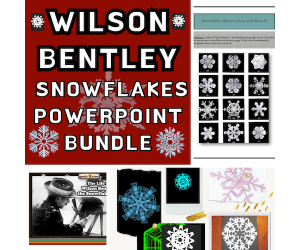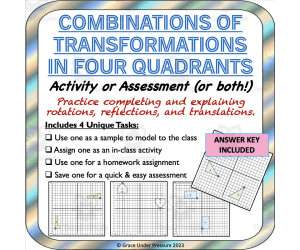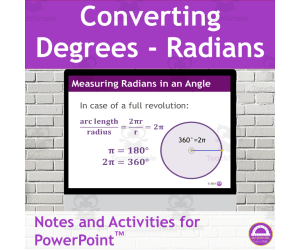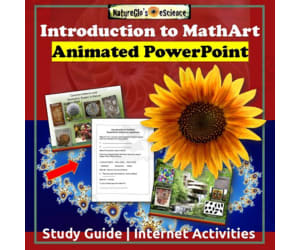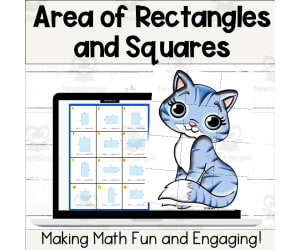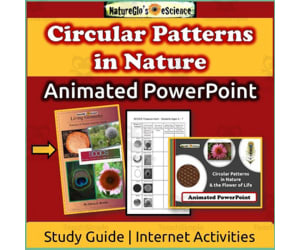2,478 products added recently
Geometry Presentations
Bring geometry to life with presentations that showcase shapes, angles, and spatial reasoning. These resources include interactive diagrams and examples to help students visualize geometric principles. Incorporate them to enhance understanding and interest in geometry.
Marine Biology - Marine Fish of the World PowerPoint BUNDLE
Math, Geometry, Grade 4, 5, 6, 7, 8, Teacher Tools, Presentations
Get ready for an exploration of the world's marine fish including coral reef fish! Did you know some of the most colorful animals in the world are fish? For example, the mandarinfish sports some of the most beautifully vibrant colors and live among gorgeous rainbow colored Pacific coral reefs from Japan to Australia. They have blue pigment, the second vertebrate in the world to have this coloration. Learners will enjoy a variety of activities relating math and art with the science of marine biology. What's Included: One Quick Start Guide Three PowerPoint presentations (PPTX and PDF files) Three Activity Guides with answer keys Topics Covered in the Presentations Include: Marine Fish Groups of the World Swimming Performance, Skin & Forms Fish Diversity Marine Fish Types: Jawless Fish Characteristics Jawless Fish Anatomy Diagram Marine Fish Types: Cartilaginous and Bony Fish Characteristics Sharks, Rays and Sawfish Family Portrait Shark Anatomy Diagram Moray Eel Jaw Anatomy Diagram Bony Fish Characteristics Bony Fish Anatomy Diagram Coral Reef Diversity and Distribution World Coral Reef Regions The Caribbean Reef Reef Fish Adaptations - Body Shape Reef Fish Coloration Major Coral Reef Fish Types - Herbivores and Planktivores Major Coral Reef Fish Types - Benthic and Piscivores Coral Reef Fish: Mandarinfish Coral Reef Fish: Foureye Butterflyfish Reef Sharks Reef Fish: Angelfish Reef Fish: Anthias Bass and Groupers Blennies Pufferfish Clownfish Triggerfish Coral Reef Fish Conservation What's Inside of the Activity Guide, Intro to the Marine Fish of the World Activity Guide: PowerPoint Questions Drawing exercise: Hagfish and Shark Rubric for Grading Two scientific Drawing Exercises Marine Fish Journal Entry Directions for Marine Fish Cut-outs PowerPoint Questions Quiz PowerPoint Questions Quiz Answer Key What's Inside of the Activity Guide, Introduction to the Coral Reef Fish Activity Guide: PowerPoint Interaction Questions Coral Reef Species Journal Entry Observing Coral Reef Fish Activity (Video) Intro to Coral Reef Fish Quiz Quiz Answer Key What's Inside of the Activity Guide, Coral Reef Fish Species Activity Guide PowerPoint Interaction Review Questions Coral Reef Fish MathArt Activity Design Your Own Triggerfish Species Activity Quiz Quiz Answer Key
Author NatureGlo's eScience
Tags Ocean Animals, Marine Life Fish, Fish And Marine Life, Colorful Marine Fish, Coral Reef Fish, Ocean Activity Sheets, Cool Ocean Animals, Beautiful Ocean Animals, Underwater Ocean Animals
Snowflake Unit Study - Wilson Bentley PowerPoint BUNDLE
Math, Geometry, Grade 4, 5, 6, 7, 8, Presentations, Teacher Tools
The Wilson Bentley snowflake PowerPoint unit study BUNDLE covers meteorology, snow science, history, art, geometry, and more. This multi-subject unit study will grab and hold the attention of your students during the holiday and winter season. Since 2003, I've guided my students through this favorite winter and holiday season unit study. Jericho, Vermonter, Wilson Bentley, a farmer, is best known as the first person to photograph snowflakes using an old time bellows camera hooked up to a microscope. He spent many years perfecting his technique using a turkey feather to carefully position each snowflake under his microscope. He used great patience to scratch out each and every snow crystal image to reveal their beauty and wonder! What's Included: 1 Quick Start Guide 3 animated PowerPoint presentations (PPTX and PDF file options) 1 Activity Guide What Topics are Covered in the PowerPoints: What are snowflakes Snow - Graupel (soft hail) How snowflakes form Snowflake life cycle How artificial snowflakes are made How snowflakes grow Snowflake growth - crystal size What was the largest snowflake recorded? Snowflake symmetry Snowflake classification system Life of Wilson Bentley Wilson Bentley's Snow Crystal Capture Method Wilson Bentley's accomplishments Snowflake mathematics overview Snowflake mathematics: reflection symmetry What's Inside of the Geometric Beauty of Snowflakes Activity Guide? Journal questions Snowflake Observation and Sketch Snowflake Video Questions Snow Crystal Geometry Questions Snowflake drawing How to catch and observe snowflakes
Author NatureGlo's eScience
Tags Snowflake Bentley, Snowflake Geometry, Wilson Bentley Snowflakes, Snowflake Life Cycle, Snowflake Under Microscope, Snowflake Video
Transformations Activity: Rotations, Reflections & Slides- 4 Quadrants
Math, Geometry, Graphing, Measurements, Grade 5, 6, 7, 8, 9, Presentations, Teacher Tools
Transformations Activity : Rotations, Reflections & Slides in 4 Quadrants This engaging teaching resource is specially designed for middle school educators, particularly those teaching students in grades 6 to 9 about transformations and 4 quadrant Cartesian planes. How to Use: This package includes 4 different worksheets. On each one, a shape starts out in one place on the Cartesian plane and ends up in another place. Students are tasked with explaining how that shape could have moved from the starting position to the final position using at least two different transformations. For example, they may describe a translation and then a reflection. Or they may describe a rotation and then a translation. They are multiple ways to move the shapes from start to finish. Students are encouraged to use as much precise mathematical language as possible including naming lines of reflection and centers or rotation (using coordinates), describing the amount and direction of a rotation, and describing the size and direction of translations. I would do one of the 4 activities as a whole class. Then, allow students to work in pairs or small groups to complete another. Next, assign one for homework. Finally, keep one for a quick in-class quiz/assessment. A sample answer key is included, but each question has multiple ways to be solved. Grades to Use With: This lesson is designed for students in grades 5-8 who are learning about topics including transformations and integers. It could also be used for high school special education classes. What's Included: 6 Page PDF: Title Page, 4 Student Worksheets, Sample Answer Key If you enjoy this geometry activity , check out others in my store: Geometry Project: Park Design: Area, Perimeter, and Volume with Budgeting Middle School Math Stations or Centers: Triangles, Angles, Area Middle School Math Stations or Centers: Area, Perimeter, and Volume Relationship Between Area and Perimeter: Math Inquiry Prompt Real Life Surface Area and Volume Calculations
Author Grace Under Pressure
Tags Transformations, Rotations, Reflections, Slides, Coordinate Planes, Integers, 4 Quadrant, Cartesian Plane, Geometry, 8th Grade Math
Patterns in Nature - Concentric Rings
Math, Geometry, Grade 3, 4, 5, 6, Teacher Tools, Lesson Plans, Presentations, Activities, Projects
Get ready to explore Patterns in Nature - Concentric Rings found in nature, art, and beyond here on Earth and throughout the universe! Did you know that concentric rings can be found not only in nature but also in art, technology, and even in our solar system and beyond? Bring any elementary math lesson alive with this geometry-centered mini unit study. Don't let the "mini" part of the lesson fool you as you and your learners can jump down myriads of learning rabbit holes for up to months at a time with the given complimentary Internet Activities. Learners enjoy learning about where concentric rings and polygons are found beautifully throughout nature from the cross-section of a tree to the rings of Saturn. There was even a strange discovery of rings forming on rocks through a chemical reaction! Concepts Covered: Geometry definition of concentric rings Concentric polygons How to find the area of concentric rings Examples of concentric rings in nature and art Concentric rings found in rocks and minerals Liesegang Rings Concentric rings found in water Russian Painter, Wassily Kandinsky's Squares with Concentric Circles Saturn's concentric rings What's Included: 7-slide PowerPoint PDF version of PowerPoint Quick Start Guide Internet Activities: videos, project ideas, web resources
Author NatureGlo's eScience
Tags Math Art, Math, Geometry, Concentric Rings, Patterns In Nature, Concentric Circles, Wassily Kandinsky
Converting Degrees and Radians Presentations and Exercises
Math, Calculus, Geometry, Common Core, Grade 10, 11, 12, Teacher Tools, Presentations
Introducing the ultimate PowerPoint presentation that encompasses everything you need to introduce and practice the vital skill of converting between degrees and radians. This comprehensive and meticulously crafted resource is designed to empower both educators and students, fostering a deep understanding of this fundamental mathematical concept. Whether you're conducting in-person classes or engaging in distance learning, this versatile presentation is digital and printable, accommodating various teaching and learning modalities. With its seamless adaptability to synchronous or asynchronous learning environments, it offers unparalleled flexibility for educators and students alike. Prepare to equip your students with a rock-solid foundation in degrees and radians conversion using this all-encompassing resource. Within its pages, you will find 26 carefully curated exercises that cater to a range of skill levels and learning preferences. From introductory problems to more complex challenges, this presentation has you covered. Each exercise is thoughtfully designed to promote active engagement, critical thinking, and skill development. Additionally, the presentation incorporates class practice exercises, ensuring that students have ample opportunities to apply their newfound knowledge in a supportive and interactive setting. We understand that as an educator, convenience is key. That's why we have included a comprehensive answer key, effortlessly accessible, to streamline your workflow and provide instant feedback to your students. With this invaluable resource at your fingertips, grading becomes a breeze, allowing you to allocate more time and energy towards engaging with your students and tailoring your instruction to meet their individual needs. Aligned with the Common Core State Standards for Mathematics, this presentation not only covers the essential concept of converting radians to degrees and vice versa but also connects these skills to broader mathematical concepts. By delving into radian measure as the length of the arc on the unit circle subtended by an angle, students gain a deeper understanding of trigonometric functions and their extension to all real numbers. The presentation elucidates how the unit circle in the coordinate plane serves as a powerful tool for interpreting radian measures of angles traversed counterclockwise. Moreover, this resource transcends the boundaries of a mere slideshow. It serves as a comprehensive learning companion, providing a wealth of engaging visuals, interactive elements, and real-world examples. The carefully crafted content facilitates concept mastery while stimulating student curiosity and active participation. It's not just a presentation ; it's an immersive learning experience that captivates students' attention and fosters a deep connection with the material. COMMON CORE STANDARDS: CCSS.Math.Content.HSF-TF.A.1: Understand radian measure of an angle as the length of the arc on the unit circle subtended by the angle. CCSS.Math.Content.HSF-TF.A.2: Explain how the unit circle in the coordinate plane enables the extension of trigonometric functions to all real numbers, interpreted as radian measures of angles traversed counterclockwise around the unit circle.
Author Matemaths
Tags Matemaths, Radians Degrees, Presentation, Worksheet, Converting Between Radians And Degrees Worksheet
Math Art Geometry Patterns in Nature PowerPoint
Math, Geometry, Grade 3, 4, 5, 6, 7, Teacher Tools, Presentations
Math Art Geometry Patterns in Nature PowerPoint: A Comprehensive Educational Tool Math Art Geometry Patterns in Nature PowerPoint is a comprehensive teaching resource that serious educators should consider. By focusing on patterns found in nature, it encourages active learning among students from grade 3 to grade 7, fostering engaged and practical applications of math study. Cultivating Real-world Discovery We aim for students to extend their learning beyond the conventional classroom setting with this tool. It inspires exploration and discovery of diverse geometrical patterns like hexagons, spirals, stars or fractals around them. Learn by observing: Involve nature into education process. Promotes critical thinking: Inspire curiosity about how mathematics shapes our world. Diverse Connections with Geometric Concepts This tool broadens student understanding by connecting geometric concepts to various objects such as quilt work or stained glass windows. Ever puzzled over the Fibonacci number series? Or about the Golden ratio? This well-designed resource presents these mathematical complexities using methodologies accessible for middle graders (grades 4-7). Educator friendly & Technologically savvy This educational tool incorporates an elaborate 29-slide PowerPoint presentation, compatible with Microsoft Office's .pptx,.ppt formats along with a Pdf file version. It also comes supplemented by a ten-page study guide including an answer key assuring every piece required for effective facilitation towards geometry when using this material either whole group lesson format at school or small group assignments at home. A New perception towards Everyday Math The Math Art Geometry Patterns in Nature is more than just another instructional aide; it's an invitation to explore how omnipresent math truly exists at every turn – from whirlpools' spiral movement to geometric structure within pine-cones; it’s showcasing each student that they are surrounded by beauty stemming from intricate mathematical expressions which are attainable despite their complexity.
Author NatureGlo's eScience
Tags Math Art, Geometry Patterns, Nature Exploration, Hands-on Engagement, Mathematical Connections
Area of Rectangles & Squares Digital Self-Checking Activity (Slides)
Math, Geometry, Measurements, Grade 4, Presentations, Teacher Tools
Area of Rectangles & Squares Digital Self-Checking Activity (Slides) Area of Rectangles & Squares Digital Self-Checking Activity (Slides) is a specialized teaching resource, crafted specifically for Grade 4. It enhances math learning and imparting a fun and interactive experience in the topics of geometry and measurements using Google Slides. No additional preparation time is needed, simply add it to your Google Drive, assign it to students. Being digital makes this tool extremely accessible for teachers whether they are based in public school settings or conducting homeschooling sessions. Features Presents 12 different challenges concerning areas of rectangles and squares. Incorporates puzzles that students solve by calculating answers on whiteboards or scratch papers then drag correct responses over the matching query on the slides – making learning engaging! A Student Recording Sheet prompting students to share their steps towards solutions encourages practice by showing not just telling them how processes work. Evaluation Support The packaged Teacher Answer Key lets you quickly compare pupils' work with correct solutions saving crucial time during revision periods or checking homework tasks. Versatility This activity can be adapted into: Morning work drills, Bell-ringer activities, An exit ticket accountability system, A "check-for-understanding" tool during lessons, '; ' '; ' This ed-tech approach combines procedural alongside conceptual understanding for area calculations involving rectangles and squares making often tough traditional methods much more digestible for young learners who respond positively when incorporating digital methods. Bring about positive change into your class now with this exclusive educational resource! "
Author Digitally Yours Shop
Tags Geometry, Measurements, Digital Learning, Interactive Activity, Problem-solving
Circular Patterns in Nature PowerPoint with Study Guide
Math, Geometry, Grade 3, 4, 5, 6, Teacher Tools, Lesson Plans, Presentations, Activities
Circular Patterns in Nature PowerPoint with Study Guide Engaging with nature offers unparalleled learning opportunities for students. The captivating 'Circular Patterns in Nature' mini-unit study enhances these educational experiences. It serves as a comprehensive teaching resource perfectly tailored for grade 3 to grade 6 students. This product is carefully designed to excite and inspire learners about the intricacies of nature while reinforcing significant core concepts in math and geometry. The cornerstone of this resource is an outdoor treasure hunt adaptable for all seasons, which sees students identifying, observing, and investigating various naturally occurring circular patterns within their surroundings. As they step out of the classroom, they encounter first-hand the beauty of Sacred Geometry unfolding around them - the engaging point where mathematics meets art and history. About 'Circular Patterns in Nature' mini-unit study: Nurtures a fascination for shapes, patterns, and numbers Introduces learners to essential mathematical concepts through practical engagement. Promotes critical thinking skills Cultivates a sense of curiosity about our shared natural world. This remarkable resource package includes: A dynamic 13-slide PowerPoint presentation examining global instances of nature's sacred circular patterns – from elegant spirals to significant complex designs such as the ancient 'Flower of Life'. A detailed 19-page Activity Guide brimming with suggested projects provides great versatility; educators can adapt activities according to learner maturity or knowledge level or learning environment constraints (be it small groups or homework assignments). Easy-to-use web resources offering additional activities have been incorporated into this package for additional support at your fingertips. The supplemental resources accompanying this unit include varied age-specific Venn Diagram worksheets promoting active comprehension analysis across learned themes; hands-on outdoor treasure hunt instructions; suggestive guiding questions propelling explorative discourse; and inspiring authentic photographs exemplifying five central geometric principles observed worldwide: Spirals, Curves, Ovals, Circles & Spheres (SCOCS). Employing the ‘Circular Patterns in Nature’ mini-unit study gives your students a unique resource that enlivens their natural curiosity and actively ties math, geometry, writing, and art into tangible real-world applications. This cross-curricular approach boosts comprehension while cultivating an appreciation for the natural world's wonders. Navigate mathematical education in inspiring ways by integrating the engaging 'Circular Patterns in Nature' mini-unit study into your teaching toolkit today.
Author NatureGlo's eScience
Tags Circular Patterns, Nature Study, Math And Geometry, Outdoor Learning, Hands-on Activities



